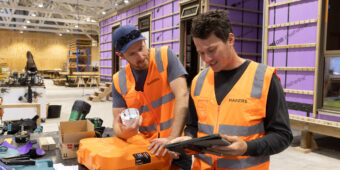Sinking to a record low
11 Aug 2015, Community & Sponsorship

With three national records in depth and distance disciplines, Dave Mullins is arguably New Zealand’s best free diver. With the help of PlaceMakers Evans Bay, he’s on the cusp of taking his career to new depths
As a sport, free diving consists of two main competitive classes – depth and distance. Divers need to swim as deep or as far as they can on a single breath, with distance competitions generally held in Olympic-sized swimming pools. In each class, there are disciplines with and without fins.
Dave has previously set six world records in the pool, but is currently focused on depth diving. He is just weeks away from attempting to break the constant weight apnea (CWT) world record, currently held by Russian Alexey Molchanov. In CWT competitions, divers can wear fins, but aren’t allowed to use a guide rope to propel themselves during the descent or ascent.
Dave set the CWT national record in 2013, with a 125m dive in Kalamata, Greece. To break the record, he’ll need to reach at least 129m, which he is confident he’ll be able to achieve.
“When I reached 125m, it was a really clean dive and I felt I could have gone deeper. On the strength of that, I’m confident I can get the record,” he says. “The important thing for me is making sure I equalise properly; it’s probably the biggest skill component of deep free diving.”
Dave got involved in the sport through his passion for spear fishing, and has been competing for more than ten years. He says that without the support of PlaceMakers Evans Bay, he wouldn’t be where he is today.
“I only get a few opportunities to attend world depth competitions; without my sponsors, I wouldn’t have been able to attend those,” he says. “I would have been limited to pool comps in NZ; you can depth train in Lake Taupo, but it’s too cold for world record dives.”
While there is an element of risk in free diving, Dave says the short duration of the dives limits the effects of the bends and narcosis*.
“I normally take about four minutes to complete a deep dive. Nitrogen and carbon dioxide narcosis can be problems for us, because we’re swimming so much. Ultimately though, a blackout is what will stop the dive.”
Dave will spend three weeks in Bali acclimatising to the conditions before attempting to break the world record on the 29–31 August.
He’s going the distance
Dave isn’t the only diver who has benefited from the support of the Evans Bay team, his friend and internationally ranked free diver Chris Marshall is also sponsored by the store.
Chris was the only Kiwi in attendance at the 2015 Aida Pool World Championships, held at an outdoor pool in Belgrade, the capital city of Serbia, in June. He set several personal bests at the competition, finishing seventh in the Dynamic Without Fins competition with a 175m effort in the final.
Chris swam 169m during his heat, breaking his previous personal best by 4m to secure a spot in the A-final. He added an extra 6m, finishing seventh to place himself amongst the world’s elite.
He also set a new personal best in his Dynamic With Fins heat, swimming 211m to earn a spot in the B-final, where he finished 12th.
*Diving dangers
Nitrogen narcosis is an altered state of awareness, caused by breathing a high partial pressure or concentration of nitrogen. The deeper a diver goes, the stronger the diver’s narcosis will be. Some divers have compared the feeling of nitrogen narcosis to being pleasantly drunk, while others find it terrifying.
The bends is a physical condition caused by the formation of nitrogen bubbles in a diver’s blood and tissue. Although they are generally quite tiny, the bubbles can block the flow of blood to various parts of the body.
Main image: Dave Mullins will attempt to break the constant weight apnea world record later this month. The rules allow fins, but divers aren’t allowed to use the rope as a method of propulsion or to change their weighting. Any ballast they take with them must be brought back up again. Photo: DeeDee Flores
Register to earn LBP Points Sign in



